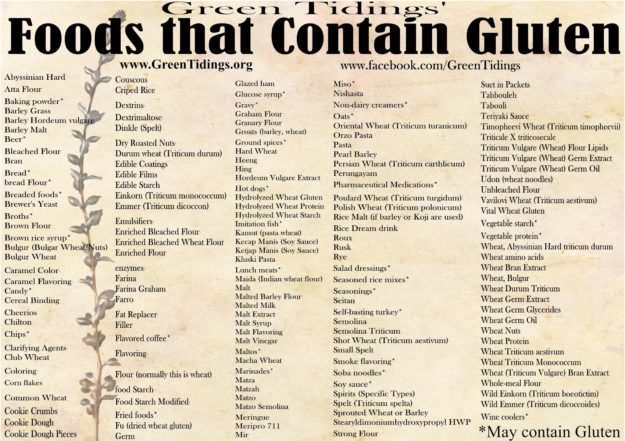Sharing is caring!
What Is Gluten?
Gluten is a composite of gliadin and glutenin and is the active protein which makes flour sticky enough to rise when baked into bread products. The more gluten there is in a grain the more stretchy the flour made from that grain will be, and the more it can rise.
What’s The Big Deal About Gluten?
For those who have autoimmune disorders such as Celiac Disease or an IgA deficiency eating gluten can provoke an inflammatory body response and is very damaging to the intestinal system. It can cause a wide range of digestive difficulties including diarrhea, constipation, bloating, gas, pain, and damage to the intestinal tissues. Additionally, many people who suffer from Inflammatory Bowel Diseases (such as Crohn’s or Ulcerative Colitis) find that they do not do well when they eat gluten.
Trudy Scott, author of The Antianxiety Food Solution notes in her book that there are a number of clinical studies showing that gluten can also provoke anxiety, depression, and other mood disorders. Trudy provides easy to understand instructions for a gluten elimination challenge on her blog.
Discover All The Different Ways Silver Can Protect With Our Silver Healer
Which Grains Have Gluten?
Fewer grains are glutinous than non-glutinous; they are easy to remember using the mnemonic BROWS (Barley, Rye, Oats, Wheat, and Spelt). While oats do not contain gluten (they contain avenin) they are often grown near, stored with, or transported with grains that do contain gluten, so there is a concern regarding cross contamination. Many people who need to avoid gluten choose to buy certified gluten free oats. All of the other grains do not have gluten; these include quinoa, teff, amaranth, rice, buckwheat, and millet.
Gluten-free does not mean low-carb. I have heard that there are some people who think that if a product is gluten free that also means it is low-carb. Grains by their nature are higher in carbohydrates; so gluten free grains (any grains really) do not qualify as low-carb. It is important to note that some grains are lower in carbohydrates than others.
Gluten-free does not mean whole grain. Sadly many people in the search for gluten-free don’t stop to consider that the healthiest way to eat grains is in their whole form. A whole grain contains the outer bran, the endosperm, and the innermost germ where the beneficial oils are. Unfortunately many gluten-free products available on the market are not made with whole grains. They are made primarily with the starchy endosperm. Whole grains are important since the fiber and germ help to slow down how quickly your body can absorb the simple carbohydrates of the endosperm and also help to balance blood sugar levels. The fiber is also important for digestive and bowel health. Eating a diet high in simple carbohydrates can cause weight gain, intestinal problems, and other health problems.
Gluten-free is NOT a weight loss plan. I am not certain how this concept got its start. The only supposition I have (and this is my personal thought, not substantiated as yet by any studies) is that people who went gluten-free and lost weight did so either because they lost the “false fat” from inflammation, or because they changed their entire nutritional plan. By being mindful of the gluten in their food they were also mindful of other aspects of their eating which in turn lead to weight loss.
Gluten-free seems to be beneficial for athletes. While there are currently no definitive studies regarding this issue it seems many athletes are going gluten free and finding that they feel better and anecdotally report better performance. Articles about gluten-free athletic performance have appeared in magazines such as Men’s Health.
And according to the website The Gluten-Free Athlete, a number of professional athletes are following this diet. If you are interested in trying this you can either stop eating gluten and see how you do, or consider using Trudy’s gluten elimination challenge.
How Pervasive Is Gluten?
People who need to avoid gluten because of health issues need to be aware of the fact that gluten not only appears in food but also in many personal care products. Our skin is our largest body organ and anything we put on it gets into our system. Gluten can be found in lipstick, lotions, moisturizers, and shampoo products. It is important that you read the ingredients on these labels as well as on your food if you need to avoid gluten.




